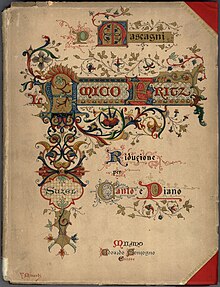Pietro Mascagni
Pietro Mascagni (born December 7, 1863 in Livorno ; † August 2, 1945 in Rome ) was an Italian composer whose operas are one of the most important representatives of verismo alongside Ruggero Leoncavallo and Giacomo Puccini .
Life
At the request of his father, a baker , Mascagni should have become a lawyer against his will , but his uncle saved him from doing so by adopting him and he could begin to study music. His first works were already quite successful, which reconciled the father with the son's career choice. Although he was promoted by a noble patron, had excellent teachers ( Amilcare Ponchielli ) and a competent friend in Giacomo Puccini , he broke off what seemed too dry for him and joined a traveling opera company.
In 1885 he was engaged as conductor of the small municipal orchestra in Cerignola , where he could earn enough to live. In addition, he was busy composing great operas: in 1888 Guglielmo Ratcliff (based on Heinrich Heine ; libretto by Andrea Maffei ) was completed, but could not inspire an impresario , and in 1889 he took part with Cavalleria rusticana in a one-act opera competition by the Italian music publisher Sonzogno . The opera won first prize and was one of the greatest successes in music history when it premiered the following year.
Mascagni had become a star of the Italian opera scene overnight and was enjoying the suddenly acquired fame and fortune. His next opera, L'amico Fritz (based on a novel by Erckmann-Chatrian ) was composed quickly, but was rather disappointed. He fared differently with the aforementioned Guglielmo Ratcliff , which premiered in 1895 with great success. He wrote other operas, which were valued by connoisseurs who noted a refinement of his personal style, but with the large audience and for posterity, Cavalleria rusticana remained the composer's unrivaled stroke of genius.
Pietro Mascagni was among others the teacher of Riccardo Zandonai .
In 1902 he traveled to the United States , and later he also brought his works to South America . He followed the growing success of his friend Giacomo Puccini with great jealousy, and in 1911 he claimed that the era of verismo was over.
In 1915 he wrote a picture-synchronous symphonic music to accompany Nino Oxilias Rapsodia Satanica , a dramma musicale cinematografico in which the diva Lyda Borelli played the leading role. The composition is of expressive, colorful harmony and uses a leitmotif technique like Richard Wagner's in the film to illustrate the intertwining of love and death. At the premiere on July 3, 1917, he personally conducted the orchestra in the Augusteo cinema . In the same year he experienced a resurgence of his fame with the successful Lodoletta in Rome. Because of his royalties for the Cavalleria rusticana , he had no financial worries until the end of his life.
From 1927 until his death he lived in the Hotel Plaza di Roma . In the 1930s he became a member of Mussolini's fascist party . His funeral on August 4, 1945, a good year after the liberation of Rome, therefore took place without representatives from the Italian state.
reception
His music was used in the classic film " How a Wild Bull " (1980) starring Robert De Niro and Joe Pesci .
The music of the Cavalleria rusticana characterizes the final part of “ The Godfather - Part III ”: The last 15 minutes of the film are underlaid with the finale of the opera; the dramatic final scene and the death of Don Corleone underline the well-known interlude.
His life story was filmed in 1953 by Giacomo Gentilomo under the title Ewige Medodie .
Works
- Cavalleria rusticana , first performance: Rome May 17, 1890
- L'amico Fritz , first performance: Rome October 31, 1891
- I Rantzau , first performance: Florence November 10, 1892
- Guglielmo Ratcliff , first performance: Milan February 16, 1895
- Silvano , first performance: Milan March 25, 1895
- Zanetto , first performance: Pesaro March 2, 1896
- Iris , first performance: Rome November 22, 1898
- Le maschere , world premiere: Milan, Genoa, Turin, Rome, Venice, Verona January 17, 1901
- Amica , first performance: Monaco (Mascagni's only opera in French) March 16, 1905
- Isabeau , first performance: Buenos Aires June 2, 1911
- Parisina , first performance: Milan December 15, 1913
- Lodoletta , first performance: Rome April 30, 1917
- Sì , first performance: Rome December 13, 1919
- Il piccolo Marat , first performance: Rome May 2, 1921
- Pinotta , first performance: San Remo March 23, 1932
- Nerone , first performance: Milan January 16, 1935
literature
- Virgilio Bernardoni: MASCAGNI, Pietro. In: Mario Caravale (ed.): Dizionario Biografico degli Italiani (DBI). Volume 71: Marsilli – Massimino da Salerno. Istituto della Enciclopedia Italiana, Rome 2008.
- Alan Mallach: Pietro Mascagni and his Operas , Boston 2002.
- ders .: The Autumn of Italian Opera. From Verismo to Modernism 1890-1915 , Boston 2007.
- Hans-Joachim Wagner: Foreign Worlds. The opera of Italian verismo , Stuttgart and Weimar 1999.
Web links
- Sheet music and audio files by Mascagni in the International Music Score Library Project
- Works by and about Pietro Mascagni in the catalog of the German National Library
- Works by and about Pietro Mascagni in the German Digital Library
- Pietro Mascagni at Klassika
| personal data | |
|---|---|
| SURNAME | Mascagni, Pietro |
| BRIEF DESCRIPTION | Italian composer |
| DATE OF BIRTH | December 7, 1863 |
| PLACE OF BIRTH | Livorno |
| DATE OF DEATH | August 2, 1945 |
| Place of death | Rome |


